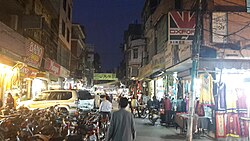Anarkali Bazaar
اناركلى بازار | |
|---|---|
 Street view of the bazaar | |
| Country | |
| Province | Punjab |
| City | Lahore |
| Administrative town | Data Gunj Buksh |
| Union council | 72 |
Anarkali Bazaar (Punjabi, Urdu: اناركلى بازار) is a major bazaar[1] in Lahore, Punjab, Pakistan. Anarkali also serves as a neighbourhood and union council of Data Gunj Buksh Tehsil of Lahore. It is situated in the region that extends from the south of Lahori Gate of the Walled City to across the Mall Road.[2]
The bazaar was listed in the 2020 World Monuments Watch by the World Monuments Fund[3] to highlight the urgent need for its preservation and protection, since it is currently endangered due to neglect.[4]
History[edit]

The Anarkali bazaar is one of the oldest surviving markets in the Indian Subcontinent, dating back at least 200 years. It derives its name from the nearby mausoleum thought to be that of a tawaif named Anārkalī, who was 'chased out of town' by order of the Mughal Emperor Akbar for having a love affair with his son, Prince Salīm, who would later become Emperor Jahāngīr.[5]

Bazaar[edit]
Shops in Anarkali sell textiles, garments, jewellery, and many other items.[6] The bazaar is now divided into two sections: the 'Old Anarkali Bazaar' and the 'New Anarkali Bazaar'. The Old Anarkali Bazaar is noted for its traditional food items while the New Anarakli Bazaar is known for its traditional handicraft and embroidery.[7] Within the New Anarkali Baazaar are markets known as Bano Bazaar, Dhani Ram Road, Jan Muhammad Road, Aabkari Road, Paisa Akhbar, Urdu Bazar and Paan Gali. New Anarkali Bazar is also famous for halwa puri, nihari and siri paye.
The mausoleum of Sultan Qutb ud-Din Aibak of Mamluk Sultanate is also located in Anarkali Bazaar. In the early 1970s, the mausoleum was renovated at the orders of the then Prime Minister Zulfiqar Ali Bhutto.[8]
See also[edit]
Bibliography[edit]
- Nevile, Pran. Lahore: A Sentimental Journey. India, Penguin Books, 2006.
References[edit]
- ^ Maneesha Tikekar (2004). The Anarkali Bazaar (Across the Wagah: An Indian's Sojourn in Pakistan). Bibliophile South Asia. pp. 83, 88 and 357. ISBN 9788185002347. Archived from the original on 27 January 2024. Retrieved 7 March 2021 – via Google Books website.
- ^ "Rekindling the Anarkali romance". www.thenews.com.pk. Archived from the original on 2022-02-01. Retrieved 2022-02-01.
- ^ Katia Hetter. "25 of the world's most endangered places". CNN. Archived from the original on 2022-01-31. Retrieved 2022-02-01.
- ^ "Anarkali Bazaar". World Monuments Fund. Archived from the original on 2022-02-01. Retrieved 2022-02-01.
- ^ "Legend: Anarkali: myth, mystery and history". Archived from the original on 2013-10-16. Retrieved 2013-09-05.
- ^ Tikekar, Maneesha (2004). Across the Wagah: An Indian's Sojourn in Pakistan, Anarkali Bazaar. Bibliophile South Asia. p. 83. ISBN 978-81-85002-34-7. Retrieved 7 March 2021.
- ^ "Anarkali Bazaar". travel.hamariweb.com. Archived from the original on 17 January 2021. Retrieved 7 March 2021.
- ^ "The Khawajas of Aibak Road". The Nation. 2014-09-07. Archived from the original on 2023-11-24. Retrieved 2022-02-01.
